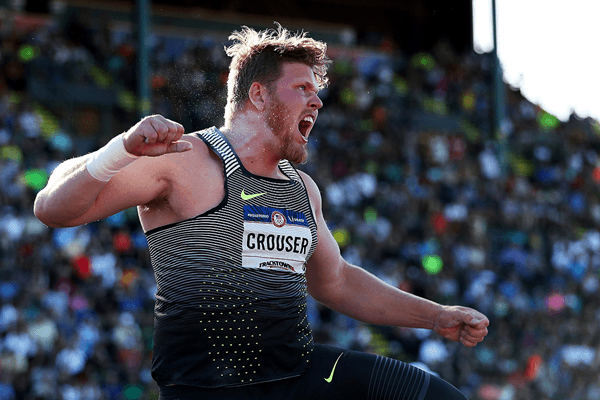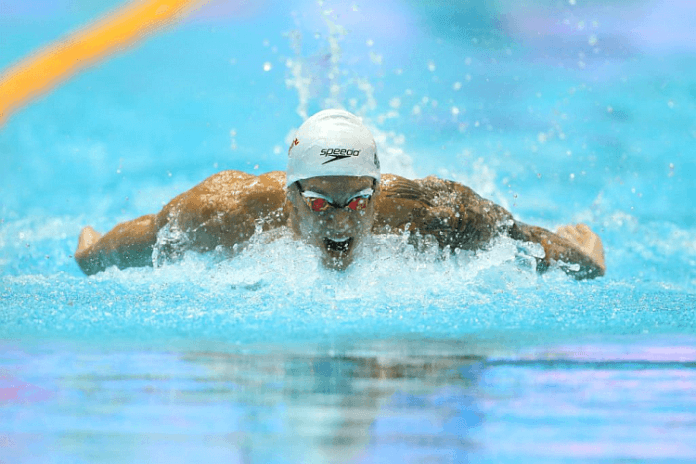Track & field’s U.S. Olympic Trials got going in Eugene, with a historic moment in the first five minutes of the meet:
In the shot qualifying, Rio Olympic champ Ryan Crouser got the Trials off to an explosive start, just after noon, when he stepped up as the fifth thrower and reaching a stunning 22.92 m or 75-2 1/2, the no. 5 throw of all time! Crouser wasn’t done either, throwing 22.64 m (74-3 1/2) in the second round, a distance only nine others – including Crouser – have ever reached. His opinion?
“I am really excited based on the fact that I was able to throw my second farthest throw ever. It was a static throw. I can add a chunk to that with a full throw. It was really easy. I was nervous hopping in that first round. Iron some stuff out this evening, and find some patience.”
He still had the final to go.
Crouser left no doubt that he was on the team with his first throw, reaching 22.61 m (74-21/4), followed two throwers later by World Champion Joe Kovacs, who sent the ball to 21.55 m (70-8 1/2). Crouser followed up with 22.55 m (73-11 3/4), while Kovacs improved slightly to 21.56 m (70-9).
In round three, Crouser was great again, out to 22.73 m (74-7), meaning all of his throws were better than everyone else’s best throw. Kovacs responded with an improvement to 22.06 m (72-4 1/2) to end any debate about second place.
Throwing now in reverse order in the finals, Kovacs threw 21.38 m (70-1 3/4), but then Crouser got the throw of his life on the final throw of the fourth round. He spun and yelled and the sphere landed further than ever before: a stunning world record of 23.37 m or 76-8 1/4!
Crouser didn’t get break the record, he annihilated the mark of 23.12 m (75-10 1/4) by Randy Barnes (USA) from 1990 at the Pepsi Invitational in Los Angeles. It’s a record Crouser was sure would come, but he didn’t know when. Here’s how dominant Crouser is: he owns five of the top 10 throws of all time.
Moreover: only 30 men in history have thrown the shot 22.00 m (72-2 1/4). Crouser has – by himself – 134 throws at 22.00 m or more. Astonishing, and the greatest of all time.
After foul in the fifth round, Crouser finished at 22.62 m (74-2 1/2) in perhaps the greatest series of all time: 22.61 m (74-2 1/4), 22.55 m (73-11 3/4), 22.73 m (74-7), 23.37 m (76-8 1/4 world record), foul, 22.62 m (74-2 1/2).
Behind him was Kovacs with his best throw coming on his last, at 22.34 m (73-3 1/2) and Payton Otterdahl, who made a late charge to 21.92 m (71-11) in the fifth round to finish ahead of Darrell Hill (21.89 m/71-10).
In the men’s 10,000 m, the starting field of 25 was barely dented through 8,000 m, with 16 men in contention. Georgetown All-American Robert Brandt was leading through 8,800 m, but the pace suddenly increased to 66.0 on the next lap as Reid Buchanan took over, trailed by Grant Fisher and Joe Klecker. Fisher then took charge with a 63.33 lap to reach the bell, and then it was a mass sprint with 10 men still in it on the final lap. It was Woody Kincaid who found a 53.47 final lap to win in 27:53.62, followed by Fisher (27:54.29), Klecker (27:54.90) and then Ben True in fourth (27:58.88) and BYU’s Connor Mantz in fifth (27:59.37). Marathon Trials winner Galen Rupp moved from seventh to sixth on the final lap and finished in 27:59.43. Brandt was 12th in 28:09.92.
In the qualifying:
● Men’s 400 m: The heats were insanely fast, with North Carolina A&T’s Trevor Stewart powering down the straight to win heat one in 44.75 over LSU’s Noah Williams (45.21). Michael Cherry, no. 4 on the 2021 world list, looked easy and won heat two in 44.86, ahead of Ryan Willie (45.34) and Texas A&M’s Bryce Deadmon (45.46). LaShawn Merritt was fifth in 45.81 – pretty good for a heat – and was the last qualifier to the semis (at age 34).
Tokyo favorite Michael Norman headlined heat three, but Georgia’s Elija Godwin – third in the SEC, but who didn’t make it to the NCAAs – started in lane eight and had a huge lead coming into the straight and held on to win in 44.61, with Norman at 45.18. In heat four, NCAA sensation (and world leader at 43.85) Randolph Ross had to run from lane seven, and looked to be in trouble off the last turn, but moved up to qualify third in 45.61. Wil London won at the line in 45.46, in the same time as Vernon Norwood (45.46).
● Men’s 800 m: Former BYU star Abraham Alvarado surprised 2019 NCAA champ Bryce Hoppel in heat one, 1:48.35-1:48.38, holding him off on the final straight. The second heat was fast, with World Champion Donavan Brazier charging past three others in lane one in the final 100 m to win in 1:45.00 – wow! – with Brannon Kidder second in 1:45.06 and Isaiah Harris third in 1:45.25, with Erik Sowinski at 1:45.47 in fourth!
Heat three was slow and another mass sprint, with Michael Rhoads of the U.S. Air Force winning in 1:48.64, ahead of Sean Dolan of Villanova (1:48.68) and Brandon Miller of Texas A&M (1:48.75). Rio medal winner Clayton Murphy and NCAA champ Isaiah Jewett were the expected leaders in heat four, and Jewett led at the bell and right through the finish (1:47.83), with Murphy right alongside (1:47.84).
● Men’s hammer: American leader and world no. 2 Rudy Winkler led the men’s hammer qualifying at 79.13 m (259-7), but the no. 2 American on the season, Sean Donnelly (79.27 m/260-1) – no. 5 on the world list – failed to record a valid mark and was eliminated.
● Women’s 100 m: The racing got crazy right away, as Gabby Thomas – known for the 200 m – won the first heat in a lifetime best of 11.00 (+0.8 m/s), beating former national champ Aleia Hobbs (11.04) and Dezerea Bryant (11.09). Cam Sturgis of North Carolina A&T then showed that her NCAA win was no fluke, beating big names like Jenna Prandini (11.22) and Tianna Bartoletta (11.27) in 11.15 into a 0.7 m/s headwind.
Javianne Oliver, an under-appreciated sprinter, won heat three in 10.96 (+1.1 m/s) ahead of Kayla White (10.99) and Teahna Daniels (11.02). Then came Sha’Carri Richardson – in flowing golden hair – in heat four, who blew away the field in a sensational 10.84 (+0.9 m/s), way ahead of Mikiah Brisco (11.15) and English Gardner (11.17). Impressive; very, very impressive.
● Women’s 400 m: The modest crowd at Hayward cheered hard for Allyson Felix in the first heat, winning in 50.99, ahead of veteran Jessica Beard (51.10). Quanera Hayes romped to a huge lead by 300 m in heat two, then cruised into the finish in 52.34, just ahead of Taylor Manson (52.37). A lot of questions were to be asked in heat three, but 2019 NCAA champion Wadeline Jonathas had the best answer with a strong finish to win in 50.64 – fastest of the day – over Lynna Irby, who had a huge lead at 300 m, then struggled a little down the straight. Former USC star Kendall Ellis controlled heat four and won in 51.02, with UCLA’s Shae Anderson second in 51.32. Four-time NCAA 400 m champ at Texas and Rio 4×400 m gold medalist Courtney Okolo was fourth in 52.37 and did not advance to the semis.
● Women’s 1,500 m: The 2011 World Champion and 2016 Olympic bronze winner, Jenny Simpson, won the first race on the track on Friday in the 1,500 m heats in 4:11.34. Dani Aragon won heat two in 4:13.34 and 2021 U.S. leader Elle Purrier St. Pierre took heat three in a bunch finish in 4:11.78, with a 62-second final lap.
● Women’s 5,000 m: Abbey Cooper, who made the Rio 2016 team as Abbey D’Agostino, ran away with the first heat, taking dead aim at the Olympic qualifying standard of 15:10.00 and gritting her teeth for the last four laps, finished in 15:07.80. That was way ahead of Rachel Schneider in second (15:23.45) and allows Cooper to simply try and finish in the top three in the final to make the U.S. team.
Seven runners ran together at the bell in the second heat and four separated with 120 m to go, with Josette Norris winning in 15:32.58, ahead of Karissa Schweizer (15:32.63), Elise Cranny (15:32.71) and Elly Henes (15:32.75), with a 57.7 final lap for the leaders.
● Women’s high jump: The 12 qualifiers to the final all cleared 1.87 m (6-1 1/2), including favored Vashti Cunningham and 2016 Olympian Inika McPherson.
● Women’s triple jump: Favorite Keturah Orji led all qualifiers at 14.29 m (46-10 3/4), ahead of Jasmine Moore (14.04 m/46-0 3/4) and former American Record holder Tori Franklin (13.84 m/45-5).
● Women’s discus: The star coming in was American Record holder Valarie Allman and she caught the wind on her second-round throw and got out to the no. 2 throw in the world in 2021 and the no. 2 throw in U.S. history at 70.01 m (229-8). That was the top mark, with Rachel Dincoff following at 61.63 m (202-2) and 2012 Olympian (and former American Record holder) Gia Lewis-Smallwood third (60.94 m/199-11).
The U.S. Trials continue through the 27th; Saturday’s finals include women’s discus and the women’s 100 m.
You can receive our exclusive TSX Report by e-mail by clicking here. You can also refer a friend by clicking here, and can donate here to keep this site going.
For our 649-event International Sports Calendar for 2021 and beyond, by date and by sport, click here!


























